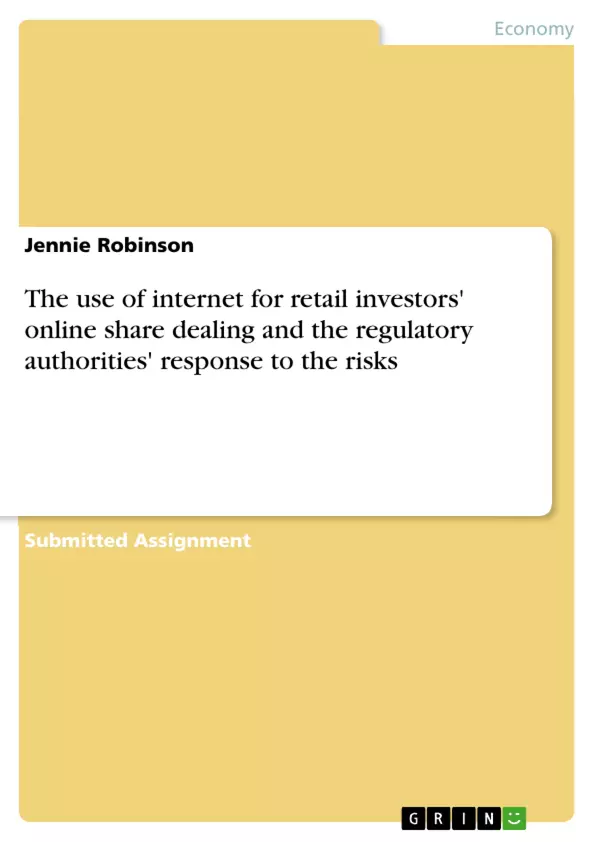As a constant flourishing place of information, the Internet has unfortunately brought fraudulent activities such as hacking data or illegal transactions, etc. Security risks continue to be challenges for regulators, industry, and jurisdictions.
Table of Contents
- Introduction
- Development
- The characteristics of the Internet and the factors that have led to widespread use of the internet for online share dealing by individual/retail investors
- The methods by which an order entered into on online share dealing venue is processed and executed, and the participants in that process
- The types of risks that have arisen for individual investors in regard to their use of online share dealing venues
- The regulatory authorities responses and advises to some of those investor risks
Objectives and Key Themes
This assignment explores the characteristics of the Internet and its impact on retail investors' online share dealing. It focuses on the risks posed by this new environment and the regulatory responses needed to mitigate them.
- The advantages of the Internet for online share dealing
- The process and participants involved in executing online share dealing orders
- The risks faced by individual investors in online share dealing
- Regulatory responses to mitigate risks in online share dealing
- The challenges of regulating online share dealing in a globalized internet environment
Chapter Summaries
The introduction establishes the context of online share dealing, highlighting the growth of internet banking and the need for regulatory attention. It defines e-banking and discusses the characteristics of the internet that make it attractive for financial services, including low cost, immediacy, flexibility, and interactivity.
The "Development" section delves into the factors driving the widespread adoption of online share dealing by individual investors. It discusses the role of cheaper trading commissions, free access to market information, and the ability to trade faster and more frequently. The section also examines the process of online share order execution, outlining the front-end, middleware, and back-end components involved. It also explores the various participants in this process, such as brokers, market makers, and clearing firms.
The third section of the development section explores the risks associated with online share dealing for individual investors. It discusses security threats like fraud and identity theft, outlining examples of successful hacking attempts and highlighting the need for robust security measures. It also discusses the lack of human interaction in online trading, which can make it difficult for investors to understand the risks involved. The section also explores other risks like system outages, price fluctuation, and the complexities of margin trading.
The final section of the "Development" chapter focuses on regulatory responses to the risks associated with online share dealing. It highlights the challenges of regulating cross-border activities in a globalized internet environment and outlines the efforts of the International Organization of Securities Commissions (IOSCO) to provide guidance and ensure investor protection.
Keywords
This assignment examines the impact of the Internet on retail investors' online share dealing, focusing on risks such as fraud, system outages, and price volatility. It explores regulatory responses and the challenges of regulating online share dealing in a globalized environment. Key terms include e-banking, online share dealing, securities regulation, fraud, identity theft, system outages, price volatility, margin trading, and cross-border regulation.
Frequently Asked Questions
What are the risks of online share dealing for retail investors?
Risks include security threats like hacking and identity theft, system outages, extreme price volatility, and the lack of professional human advice which can lead to misunderstood margin trading risks.
How do regulatory authorities respond to online trading risks?
Authorities like IOSCO provide guidelines and advice to ensure investor protection, focusing on cross-border regulation and requiring brokers to implement robust security measures.
Why has the internet led to widespread use of online share dealing?
Factors include lower trading commissions, 24/7 access to market information, the speed of order execution, and the convenience of trading from anywhere.
What is the role of market makers and clearing firms in online trading?
Market makers provide liquidity by being ready to buy or sell shares, while clearing firms handle the administrative side of settling the trades and ensuring the transfer of funds and securities.
What are the challenges of globalized securities regulation?
Since the internet has no borders, it is difficult for national authorities to regulate fraudulent activities originating from other jurisdictions, necessitating international cooperation.
- Citation du texte
- Jennie Robinson (Auteur), 2016, The use of internet for retail investors' online share dealing and the regulatory authorities' response to the risks, Munich, GRIN Verlag, https://www.grin.com/document/432712



